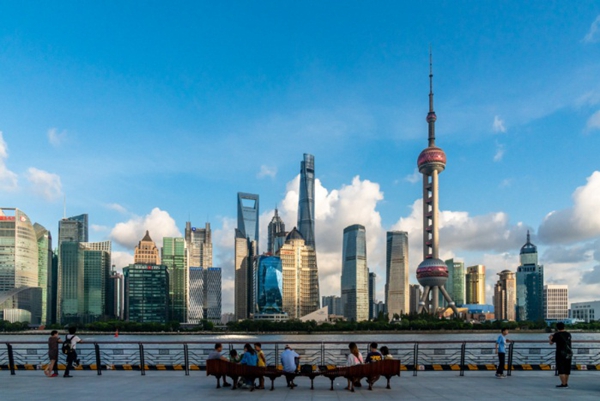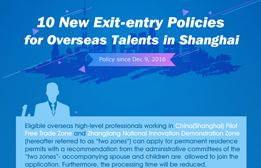Shanghai an ideal city for global scientists

Lujiazui, the financial center of Shanghai. [Wang Gang/For China Daily]
This year, renowned Japanese scientist Akira Fujishima and his research team joined the University of Shanghai for Science and Technology as full-timers, which shocked Japanese academic community.
Known as the "father of photocatalysis," Akira Fujishima is widely regarded as a promising candidate for the Nobel Prize. He has served as the president of Tokyo University of Science for eight years and was elected as a foreign academician of the Chinese Academy of Sciences in 2003.
In addition, in 2019, Japanese scientist Katsuhiko Mikoshiba, who was also a strong candidate for the Nobel Prize, joined ShanghaiTech University.
In January 2020, Nikos Logothetis, an academician at the Max Planck Institute in Germany announced that he would join the Shanghai International Primate Research Center with all laboratory members. This was regarded as a major event in the neuroscience field because the famous Max Planck Institute, which boasts 30 Nobel Prize winners so far, was called "the cradle of Nobel Prize winners".
In 2018, Nobel Prize winner Bernard Lucas Feringa obtained a foreigner's permanent residence ID card in Shanghai after joining East China University of Science and Technology the previous year.
Why did more and more scientists choose Shanghai?
City provides stage for talents
For Li Jun, chief professor of the Shanghai Mathematics Center, his life value is reflected through mathematics and the center he works at, which is a first-class academic institution in Shanghai, provides the best stage for his mathematics talent.
Li is a first prize winner of the first national middle school mathematics competition in 1978. He studied at Fudan University and Harvard University, and has taught at Stanford University. He is a leading expert in the field of algebraic geometry.
In 2019, Li returned to China as a full-timer. At that time, Shanghai was striving to become a new highland for global scientific and technological innovation. The city needed to develop the mathematics discipline more than ever, and the Shanghai Mathematics Center took the reins.
Like Li, many scientists care about the academic platform. Yang Guangzhong, an academician at the British Royal Academy of Engineering, chose to return to China as a full-timer in 2019 because he wanted to establish the Institute of Medical Robotics at Shanghai Jiao Tong University. Likewise, Greek scientist Evangelos Tatsis chose Shanghai because at the Center for Excellence in Molecular Plant Science of the Chinese Academy of Sciences, he can discover more modern medicines from Chinese medicine.
Shanghai boasts many sci-tech resources such as prestigious universities, national-level key laboratories as well as a large number of world-class facilities. There is always a stage for talent.
Young people play pivotal roles
Thirty-four year-old Kou Xufeng has achieved a lot since he chose ShanghaiTech University after he graduated from the University of California at Los Angeles (UCLA) with a PhD in microelectronic devices.
Kou was also an excellent graduate student at Zhejiang University's Chu Kochen Honors College. While working towards his PhD at UCLA, he published 35 papers, most of which were published in top international journals.
In the second year after joining ShanghaiTech University, Kou and a scientific team led by several Chinese scientists found the "angel particle", which the world's physics community had been exploring for nearly 80 years, and published more than 30 papers in top journals.
ShanghaiTech University's flexible study and research mechanism for young scholars benefited Kou as well as many others. Andre Rosendo, a postdoctoral fellow at the University of Cambridge, was given his own laboratory when he joined ShanghaiTech University at only 32 years old.
Liu Zhen was the youngest head of a research group at the Center for Excellence in Brain Science and Intelligence Technology of the Chinese Academy of Sciences in Shanghai. When he cloned the first monkeys with a technique that made Dolly the sheep in 2018, he was only 30 years old without any outstanding academic background.
Trust and resources given to young talents while they're starting out directly determines the height of their future development. Shanghai has been rolling out talent programs to support the development of young scholars by giving them resources and opportunities. This move is not only intended to attract more outstanding researchers who are in the early stages of their careers, but also to help them bloom early in the golden age of scientific research.
Caring government services are offered
Dr. Zhou Xiaozhou from Columbia University in the United States found a good way to recycle steel slag while studying for his PhD, which has a very broad domestic market in China. In 2019, he moved his environmental protection technology company to Shanghai Caohejing Pioneer Park for Overseas Students.
Zhou said what attracted him most is Shanghai's comprehensive development environment and the city's tailor-made policies for overseas returnees. Benefitting from favorable policies in Shanghai, he and his two partners settled down in Shanghai quickly. They also got the financial support from the Pujiang Talent Program, and due to the epidemic last year, their company's rent was exempted.
In recent years, Shanghai has made intensive adjustment to talent policies. The city has upgraded its 20 provisions to 30 provisions concerning new talent policies and has broadened eligibility for permanent household registration for fresh graduates and overseas returnees, creating a friendly environment for sci-tech talent.
Last year, 22,000 overseas returnees have settled down in Shanghai. More than 50 percent of them graduated from the top 100 universities in the world. Nearly 80 percent of them graduated from the top 300 universities in the world.
For those overseas returnees who want to be entrepreneurs, there are various kinds of entrepreneurial parks and incubators in Shanghai that can teach and help them start businesses.
Improving government services also makes Shanghai more appealing. Simon Lichtenberg, a Danish entrepreneur who has been in Shanghai for 28 years, said he used to go to the government for meetings but now the government comes to the company. The government becomes service-oriented, like a "waiter".
Zhu Long of Yitu Technology chose Shanghai because Shanghai's pragmatic and delicate urban style is suitable for artificial intelligence entrepreneurship. Zhang Shaodian of Synyi chose Shanghai's Zhangjiang because of the local atmosphere, and especially having the opportunity to be highly valued by the government. From people looking for policies to policies looking for people, Shanghai brought scientists and entrepreneurs closer to the government, making the city a paradise for innovators and entrepreneurs.
Life is very convenient
Dr. Pius S. Hornstein, head of Sanofi Greater China, one of the world's top 10 multinational pharmaceutical companies, came to Shanghai in early 2019. What impresses him most about Shanghai are the availability of COVID-19 vaccines and the number of coffee shops.
In Shanghai, one can be vaccinated against the COVID-19 easily. The vaccination vehicle directly drives to the vicinity of Hornstein's company, which is very convenient. A big part of Sanofi's main business is vaccine research and development and bringing vaccines to China. As an expert, Hornstein recommends China's COVID-19 vaccine.
When it comes to coffee shops, Shanghai has the most in the world. There are more than 6,900 cafes in Shanghai, far surpassing 3,200 in London, 3,800 in Tokyo and 1,500 in New York, and many have their own characteristics. The cafes not only represent the food and drink culture, but also the temperament and vitality of the city.
In the eyes of foreign scientists, Shanghai is very safe. It ranks high on the list of the safest cities in the world. Shanghai has beautiful rivers to walk along, and the city is very suitable for cycling. Shanghai has also become greener and its air quality is getting better.
In Shanghai, you can eat hometown food from the other side of the earth and enjoy wonderful concerts. There are many high-quality international schools and international hospitals, which can satisfy the various needs for families.
Shanghai has been repeatedly rated as the most attractive Chinese city in the eyes of expats, and ranks first among the most attractive cities for young scientists under 30 in the world. "High-quality life" has become a key word repeatedly mentioned to describe the city.
There are more reasons than the ones listed above to love Shanghai. As Shanghai redoubles its efforts, it will give more and more reasons for scientists around the world to settle in the city. Every scientist has the chance to make a highlight reel in Shanghai.

 Print
Print Mail
Mail




